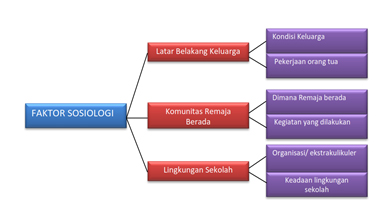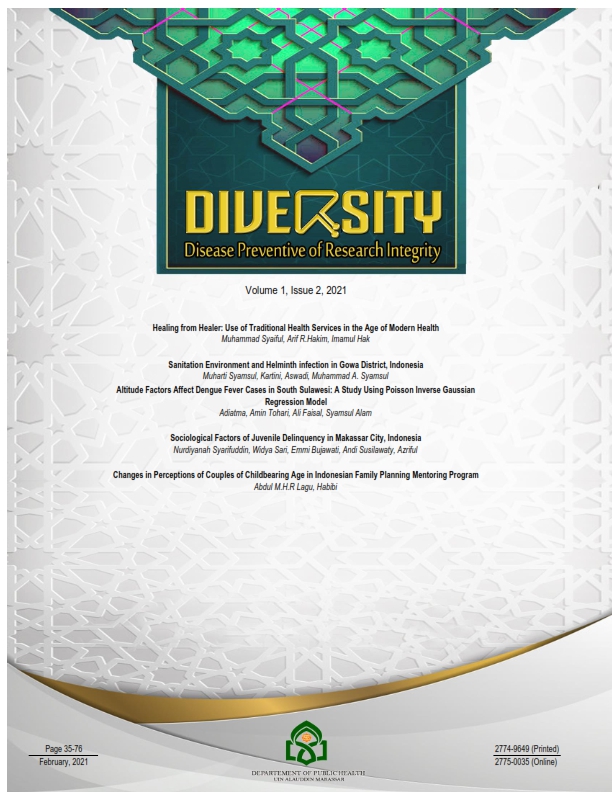Sociological Factors of Juvenile Delinquency Makassar City, Indonesia
Abstract
The factors that influence delinquency in adolescents are sociological factors, psychological factors, and biological factors. Sociological factors include family background, the community where adolescents are, and the school environment. This study used a qualitative method with a case study design. The number of informants was 10 people consisting of delinquency teenagers, parents of delinquency teenagers, women, and child protection investigators, and clinical psychologists at the integrated service post for women and children protection. Data collection was carried out through in-depth interviews. Data analysis was performed by source triangulation. The results showed that economic difficulties made parents have to work more. Teens have a playgroup that influences them. Problems that arise from the school environment make children not want to go back to school. This study recommends the importance of the role of parents, government officials, and schools in giving attention and guidance to adolescents in order not to act wrong, both moral guidance and religious guidance.

Downloads
References
Amin, M., Larasati, S. S., & Fathurrochman, I. (2018). Implementasi Manajemen Kesiswaan dalam Meningkatkan Prestasi Non Akademik di SMP Kreatif ‘Aisyiyah Rejang Lebong. Jurnal Literasiologi, 1(1), 103-121.
Arifin, Z. (2015). Perilaku remaja pengguna gadget; Analisis teori sosiologi pendidikan. Tribakti: Jurnal Pemikiran Keislaman, 26(2), 287-316.
Astuti, D., Rivaie, W., & Ibrahim, Y. (2013). Analisis Peran Orang Tua Dalam Meningkatkan Hasil Belajar Siswa Kelas X SMK Muhammadiyah Pontianak. Jurnal Pendidikan dan Pembelajaran Khatulistiwa, 2(6).
Azmi, N., & Rani, F. (2017). Pengaruh Globalisasi Terhadap Peredaran Narkotika di Asia Tenggara Tahun 2011-2015 (Doctoral dissertation, Riau University).
Baharuddin, H., Multazam, A. M., & Asrina, A. (2019). Fungsi Seksual Perempuan Menopause di Kota Makassar Tahun 2018. Al-Sihah: The Public Health Science Journal, 11(1).
Barus, C. P. (2013). Sosial Ekonomi Keluarga dan Hubungannya dengan Kenakalan Remaja di Desa Lantasan Baru Kecamatan Patumbak Kabupaten Deli Serdang. Welfare State, 2(1), 222004.
Dazeva, V. (2012). Perbedaan kecerdasan emosional siswa ditinjau dari jenis kegiatan extrakurikuler: differences student’s emotional intelligence seen from extracurricular activities type. Psikologia: Jurnal Pemikiran dan Penelitian Psikologi, 7(2), 81-92.
Duffy, A., Dawson, D. L., & Das Nair, R. (2016). Pornography addiction in adults: A systematic review of definitions and reported impact. The Journal of Sexual Medicine, 13(5), 760-777.
East, L., Jackson, D., O’Brien, L., & Peters, K. (2012). Stigma and stereotypes: Women and sexually transmitted infections. Collegian, 19(1), 15-21.
Hasibuan, K. A., Marlina, M., Ekaputra, M., & Ikhsan, E. (2016). Perlindungan Hukum Bagi Anak Pelaku Tindak Pidan (Studi Putusan Pengadilan Negeri Medan Nomor: 27/Pid. Sus-Anak/2014/PN. Mdn). USU Law Journal, 4(3), 135-150.
Kasim, F. (2014). Dampak perilaku seks berisiko terhadap kesehatan reproduksi dan upaya penanganannya (Studi tentang perilaku seks berisiko pada usia muda di Aceh). Jurnal Studi Pemuda, 3(1), 39-48.
Kurniawati, H. (2018). Hubungan Keberfungsian Keluarga Dengan Kompetensi Sosial Yang Dimediasi Oleh Regulasi Emosi Pada Remaja Delinkuen (Doctoral dissertation, University Of Muhammadiyah Malang).
Kusumaryani, M. (2017). Ringkasan Studi: Prioritas kesehatan reproduksi remaja untuk menikmati bonus demografi.
Mulyadi, Y. B. (2017). Hubungan persepsi keharmonisan keluarga dan self esteem dengan kenakalan remaja. Jurnal Pekan: Jurnal Pendidikan Kewarganegaraan, 2(1), 22-32.
Hapsari, U. R. (2010). Hubungan Antara Minat Mengikuti Kegiatan Ekstrakurikuler Dengan Intensi Delinkuensi Remaja Pada Siswa Sekolah Menengah Kejuruan (SMK) Di Kota Semarang (Doctoral dissertation, Universitas Diponegoro).
Sedgh, G., Finer, L. B., Bankole, A., Eilers, M. A., & Singh, S. (2015). Adolescent pregnancy, birth, and abortion rates across countries: levels and recent trends. Journal of Adolescent Health, 56(2), 223-230.
Suzanna, S. (2015). Hubungan Kontrol Diri Dan Status Sosial Ekonomi Keluarga Dengan Perilaku Kenakalan Remaja Di SMK Gajah Mada Palembang Tahun 2014. Masker Medika, 3(2), 12-21.
Utomo, S. T., & Sa'i, A. (2018). Dampak Pornografi Terhadap Perkembangan Mental Remajadi Sekolah. ELEMENTARY: Islamic Teacher Journal, 6(1), 170-192.
WHO. 2010. Mental Health and Development: Targeting People with Mental Health Conditions as a Vulnerable Group. Geneva: WHO Press.
Yutika, D. A. (2015). Delinkuensi Pada Remaja Putri Yang Ditinggal Ayah (Doctoral dissertation, Universitas Negeri Semarang).
Copyright (c) 2021 Nurdiyanah Syarifuddin, Widya Sari, Emmi Bujawati, Andi Susilawaty, Azriful

This work is licensed under a Creative Commons Attribution-NonCommercial-ShareAlike 4.0 International License.
Authors retain copyright and grant the journal right of first publication with the work simultaneously licensed under a Creative Commons Attribution-NonCommercial-ShareAlike 4.0 International License that allows others to share the work with an acknowledgment of the work's authorship and initial publication in this journal.
Authors are able to enter into separate, additional contractual arrangements for the non-exclusive distribution of the journal's published version of the work (e.g., post it to an institutional repository or publish it in a book), with an acknowledgment of its initial publication in this journal.
Authors are permitted to publish their work online in third parties as it can lead to wider dissemination of the work.





